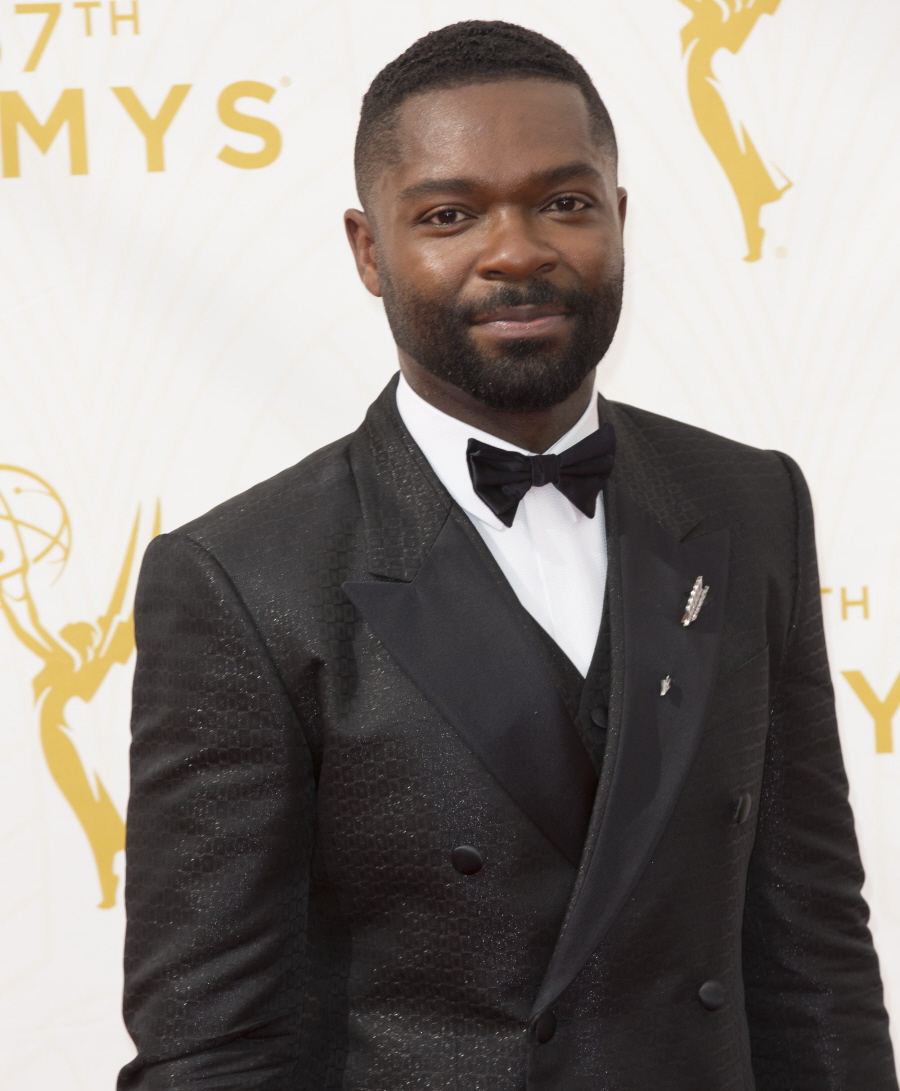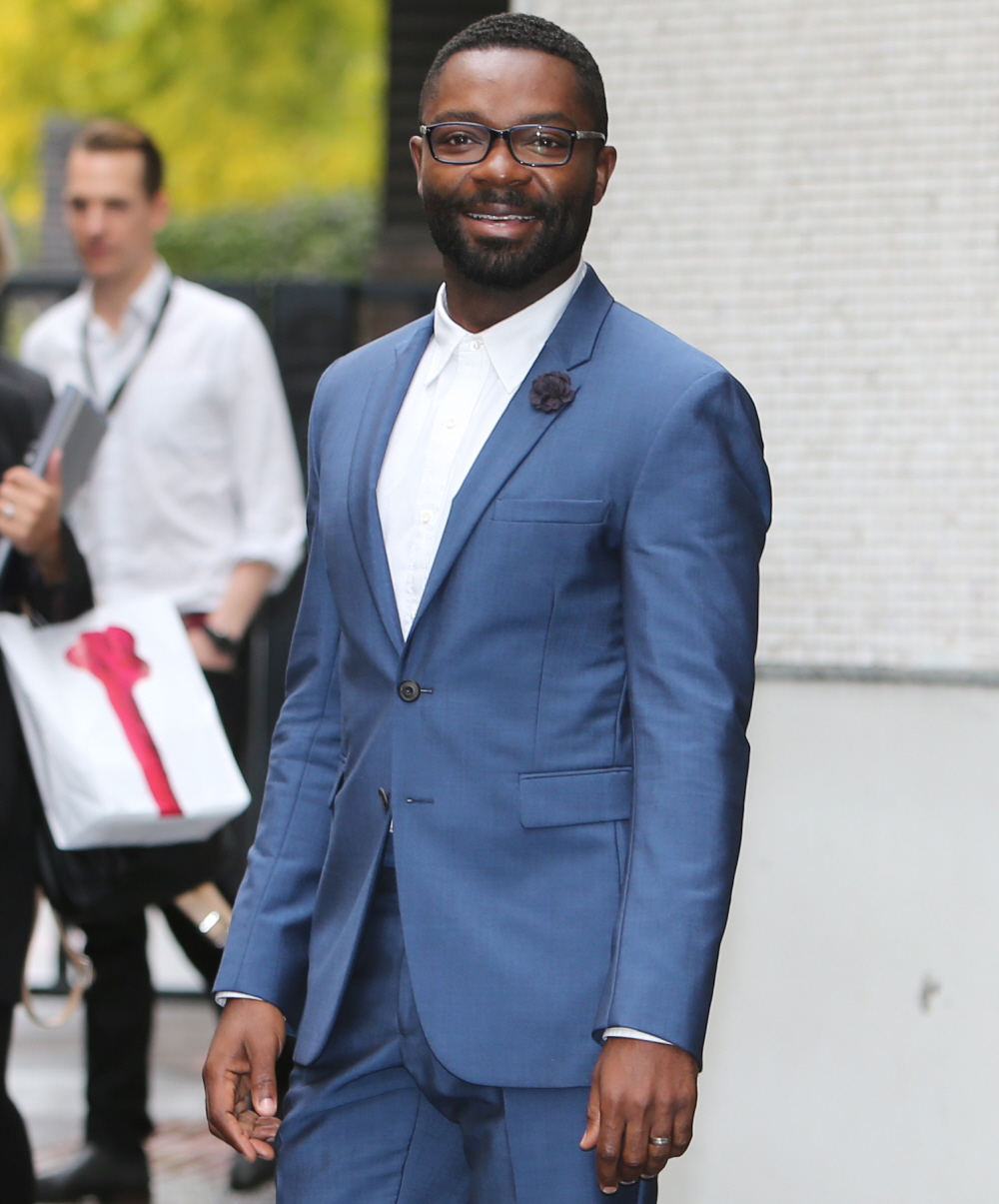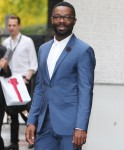Here are some assorted photos of David Oyelowo from the past few weeks, including some pics of him at the Emmys two weekends ago. I’m still mad that Oyelowo didn’t get an Oscar nomination for Selma earlier this year. It still fills me with a wave of sadness, because Oyelowo really gave a star-making performance as Martin Luther King Jr. Like so many British actors these days, Oyelowo has been working a lot in American films for years now. Back in 2007, he actually made the conscious choice to move out of Britain and work exclusively in America. Why, you ask? Because as crappy as it is to be a minority actor in Hollywood, it’s a hell of a lot worse to be a minority actor in the UK. Oyelowo has talked about this before, that he just felt like the roles were lacking for him in the UK and that’s why he came to America. And in a new interview, Oyelowo says it really hasn’t gotten any better in the UK film industry.
The British actor David Oyelowo, whose role as Martin Luther King Jr in Selma earned him a Golden Globe nomination, has that he was “pushed out of the UK” through lack of opportunities for non-white actors. The 39-year-old from Oxford said prospects for black, Asian and minority- ethnic actors in Britain have declined even further since he left for America in 2007. He went on to accuse the UK creative industries of failing to nurture talent from non-white backgrounds.
“I know those opportunities are not on offer here. I felt pushed out of the UK because of the glass ceiling that I could feel my head bobbing against.”
He warned: “Every year, I have a raft of black and Asian actors coming through my home who are not only frustrated and [feel] pushed out, they are desperate. Things are worse now than they were when I was doing Spooks [from 2002 to 2004].”
As a black actor, Oyelowo said he had to work four times as hard as his friend Benedict Cumberbatch to get to a similar position. The Lamda-trained actor, whose films include The Last King of Scotland, The Help, Jack Reacher and A Most Violent Year, said offers only came from Britain after he had made it in the US. “I thought: ‘Wow, I have to leave and have success elsewhere in order for what I had by way of ability to be validated’,” he said, before pointing to other black British actors who had similar experiences, including Idris Elba, Chiwetel Ejiofor, David Harewood and Lenny James.
“The big question is: who is curating the culture?” he said at the launch of the Creative Diversity report by the Creative Industries Federation (CIF) and backed by Mobo, which has promoted diversity in music for 20 years. “Predominantly, it is white, middle-class men. What we have to do is change the demographic, change the landscape, change the faces, the genders, the people who are in those positions of power to green-light projects.”
The CIF said in the report that just 11 per cent working in the culture industries was black, Asian or minority-ethnic, and said the proportion should be “much higher”.
I think one of the big reasons why Idris Elba, David Harewood, Chiwetel Ejiofor and David Oyelowo have been able to find so much success in Hollywood is because they have all cultivated the ability to do a dead-perfect American accent. Idris especially can really sound authentically American, so much so that when I first got into him (years ago), I thought he was American. So, they can work in American projects and then, if need be, go back to their English accents for work in British productions, which is an opportunity that many African-American actors don’t have – like, when was the last time you saw an African-American actor in a BBC production?
Anyway, yes, good for Oyelowo to continue discussing this and trying to create change. And don’t forget the women of color too! There’s absolutely no reason why Archie Panjabi isn’t a huge star in the UK except for the fact that she’s British-Indian.
Photos courtesy of WENN.

















I love him since he majorly ignored Jen on the Oscar stage. He loves Angie not Jen
What does that have to do with anything? Honest to god he is talking about a really serious issue and you bring up that stupid triangle from the 90s NO ONE CARES!!!
I swear the Brad/Angie/Jen fans smh.
+1! Enough already
How old are you?
are you serious? what are you, twelve?
Jesus Christ…
I don’t know. I’ve said this before on here, but I think the outlook for BAME actors has hugely improved here over the last twenty years. Not saying there isn’t still a way to go, and actually more so for brown actors than black actors, but I do sometimes think these interviews are actors playing to an American audience rather than a reflection of the actual situation. Casts on UK TV are pretty diverse. I think the US and the UK have a similar situation.
Maybe this was more true a couple of decades back when people like Lennie James left for the US, but really not so much now. The UK’s problem is opportunities for working class actors of any ethnicity.
Plus, I’ve gone off Oyelowo since Sunday, when he was on the BBC telling us that God spoke personally to him to tell him that he would play MLK. God speaks personally to him a lot, apparently. Hmm.
I have to wonder how he plans to change the culture, as he says it must be changed, when he isn’t there to change it.
And completely ridiculous to use one of the Public School Mafia to illustrate his point. There are plenty of actors from all ethnicities in Britain who would like to see the back of their stranglehold on the industry.
But in all honesty, I think it’s a line British actors take when giving US interviews because they know Americans will like it.
I pretty much think it’s the same here as there. Diversity in front of camera better than it was. Diversity behind the camera pretty awful. UK is probably more accepting of out gay actors. US probably shuts out fewer working/lower middle class opportunities.
I think you have to take into account the political/social histories of the US and UK, slavery and colonialism to be exact. I think that this continues to influence culture and entertainment. As a result, there are differences between the UK and US.
African American culture is an integral part of American culture. African Americans are an integral part of the history of the US in a way that is very different from the UK. This may be another reason why African/UK actors have more opportunities in the US. Of course there are tons of barriers in the US but the UK does not have the history of television shows and movies with an all Black cast. This alone presents more options for African/UK actors who get to play African Americans.
I wonder if South Asians have more opportunities in the UK than in the US. I can think of at least three UK South Asian shows or with South Asian leads -The Indian Doctor, The Kumars at no. 42 and Goodness Gracious Me. Sadly I think one Indian origin guy is in all of these shows so I don’t knowif other South Asian actors have access. There is no American equivalent to this and no-the Mindy Project does not count- she rarely employs South Asian actors and absolutely no South Asian regular cast member allowed, besides herself!
As someone who grew up in North America and has watched a lot of British shows, it seems to me that South Asians are the minority group with the strongest cultural presence in the UK. I wonder if this is due to the ‘jewel in the crown’ dynamic.
Sanders
Yes. It’s the same but it’s different!
When I said “particularly for brown actors” that’s what I meant. Representation of the South Asian community (twice the size of the black minority in terms of population) in creatives is still pretty dire. Needs. Much. Work.
I have to agree with @ Sanders polite discussion of oppression in UK vs. US and how it provides diverse outlets for actors.
Also, most black actors in the UK are 1st generation UK citizens. Their history was really in either Africa or the Caribbean. Britian transfered most slaves to the Caribbean and the US, not the UK. Therefore it limits UK black actors material to mainly British contemporary or foreign work (america)
Indian actors have much more history and I would think roles in the UK.
Denisemich
You obviously dont know much about the UK. Mass immigration from the commonwealth happened in the middle part of the last century. I went to school with people who are 3rd and 4th generation black british. Indians, carribeans and africans have an equally rich history in this country.
Because he could change the system himself? Or he should stay there long past his prime of marketability proverbially banging his feets on the ceiling till they’re bloody and broken?
@leah, I wrote most black british actors not all black britians. Also, I did study at a university in england. Please read the statement prior to insulting.
“most black British actors are first generation”- this is not true. There are a whole bunch of British actors who are not first generation Adrian Lester, Lenny Henry, Lenny James , Naomi Harris, John boyega, o.t fanbegle etc etc most young actors in this country are not recently immigrated . I have no idea what gave you this idea? – not being funny but there are other black British actors bar ejifor and oyowelo.
Yeah, I’m neither British nor American, but I watch a ton of TV from both countries, and it did seem to me that Brits had way more PoC on their screens – especially on advertising and reality tv, in addition to scripted stuff. All US commercials have white, straight, generic people, and I see the same look on reality shows.
That said, maybe I’m entirely wrong! I don’t watch a lot of American reality tv, for example!
@ sixer. I think you are looking at it from the wrong angle. It’s not about playing to an audience or other. It’s a genuine feeling they carry with them and when they get a career in the us it feels like they can say this. Trust me if you talk to black actors privately this is what they all say.
I have a friend who is a (black) actor, he is successful ( as in he works both in the US and the U.K) But nowhere near as successful as oyelowo (yet, he us much younger)
This type of thing is what he says privately amongst his black and brown friends. He would never say this publically to white people especially white people in the business here in the Uk. People like oyelowo can say it without being afraid of upsetting the hand that feeds them. That is why you hear it as soon as they ” make it in America”. Not because they are wanting to make americans like them. It’s real concern to actors of colour in this country.
Hannah – I completely agree that the UK isn’t nirvana for UK BAME actors and creatives, or that people’s views aren’t shaped by the environment when (and in this case where) they started out. Where I disagree is that the UK is somehow much worse than the US. We can see that it isn’t simply by looking at the discussions on here – or, indeed, by turning on the TV and seeing pretty diverse casts in most shows.
It’s different, according to my friend who worked in both countries. In america there’s a policy in place to cast a number of ethnic miniorities in shows. The networks are always looking to cast ethnic minorities, so it’s easier to find steady employment for the general actor of colour.
Where you could argue the problem is are the stereotypes for the ethnic minorities. The Asian nerd, the strong black woman, the black sidekick etc.
I wanted to pick you up on the white working class thing. I agree to some extent but I do not think that it’s helpful to compare. White working class actors don’t have to transcend class AND colour.
Some of the best filmmakers in this country write for white working class. Andrea Arnold, Shane meadows as well as Mike Leigh and Ken Loach ( with the expection of meadows none of these filmmakers cast more than the odd black or Asian person in their movies).
Apart from Steve McQueen ( who to be fair doesn’t really make “black movies”) where are the prolific black film makers? This means there is not much to aspire to in this country and hence why all our best black actors feel happier working in America.
Hannah
I think you are getting me entirely wrong. I’m not at all saying things are entirely hunky dory. I’m simply saying that the compare and contrast is faulty since BAME opportunities aren’t fully equal either side of the pond. I concede I may be doing Oyelowo and others an injustice with the motivation for such quotes, though. Happy to take that back.
My remarks about class are economic – not ethnically-based or socially-based. Clearly, BAME actors are doubly restricted due to intersectionality. But I do maintain the most significant root of the problem is economic restriction to entry.
PS: I see your This Is England and raise you Top Boy. 😉
Sixer,I get what you are saying! 👍🏻
Topboy is ok, but we are still doing shows about black people as drug dealers ( think the show was created by a white Middle aged Irishman which may be part of the problem here..)
I am still waiting for a show that isn’t about gangs and drugs. I adore This is England. Meadows is brilliant. i absolutely love his universe. Are you watching This is England 90?
Economic restriction is not the primary factor for POC as it may be for white actors. I listened to an NPR interview with David Oyelowo where he spoke about his royal African roots. Clearly his class status, as a member of a royal family did not insulate him from racism, discrimination and the limited opportunities he faced in the UK.
For POC of all economic backgrounds, our skin colour, unfortunately, becomes our defining characteristic.
Hannah
Yes. I agree completely. If we are talking about the UK in isolation and not comparing with the US, then I think we can say that we have made great strides in casting and that TV shows are generally diverse in casting. However, the stories told are not diverse. I was on another thread hereabouts the other day moaning about the BBC failing to make working class dramas and sticking to its old script of period and shiny middle class stuff. It’s no coincidence This Is England and Top Boy are both on C4. Same goes for minority stories. Where is the new Desmonds, for instance?
And the behind the camera creative teams are still not diverse enough. If you look at what that one-person powerhouse Sally Wainwright has done for women’s storytelling here. We’ve got to give the BAME community the same creative opportunities.
The only objection I have to what Oyelowo said is the difference between the two countries. ANY actor from ANY country who has movie aspirations (rather than TV or theatre) will want to make it in Hollywood. Because it’s the global centre of the industry.
I think you could say this is true for actors from anywhere, though, the US being such a large country and the majority producer of entertainment worldwide, that for this reason alone there are more opportunities in general, why so many white actors from the UK, Canada and Australia also come and stay here.
I wouldn’t presume to discount his feelings as playing to his audience. I assume he genuinely feels that way if he says he does. I’m just sorry that anyone, anywhere has to feel that way, and I know the U.S. has a long, long way to go before things are fair.
You don’t have to like David Oyelowo. Its pretty much common knowledge. David Harewood and Marianne Jean Baptise said the same thing. Idris wasn’t getting notable work in his own country, only after he’d done The Wire on HBO did the BBC get the bright idea to cast him as the lead in Luther. Idris would have been some random jobbing actor if he had not left the country.
Leah – you’re talking about people who left twenty years ago. As I said above, things have changed hugely since then.
But i am not really am i? Look at John Boyega. Was he getting offers of big roles in the english movie industry? Was he being treated like the new Benedict Cumberbatch, Hiddleston, Garfield or even James McAvoy? How the english treat their talented white boy actors? No he broke out with that role in Attack of the Block, he still he had to go to the US to get roles on the level of those guys. English film industry largely ignored him. It was Spike Lee who saw him and thought this guy is a movie star. Then George Lucas followed, now they are saying he reminds them of a young Denzel Washington. This movies star potential was not recognised in his own country. Why do you think that is?
By the way I only mentioned those older people because they are on record, like other commentators have said younger actors probably don’t dare to speak up.
Leah, there are a couple of factors that are the reasons for this phenomenon. First, the fact that black people make up 13% of the US population and 3% of the British population. We also have excellent acting training in Britain and, frankly, an education system that even at its worst does make an effort to include the arts.
So you have excellent black British actors who aren’t getting parts in the UK. Partly that is because they are working class (and this phenomenon can also be seen with white actors like Jack O’Connell, who has had his main success in the US) but partly it is because it is expected that there will be more roles for black actors in the US due to the different demographics of the population. Do we need to do more in the UK? Yes, absolutely. But it is also the case that there are more roles in the US and that our talented black actors will go there to seek them out.
Tina! I am from London, i know the demographic and the british theatre education system very well. You say black is only 3%, you are not counting mixed raced people, south east asians or chinese. I don’t think Oyelowo meant only actors with two black african parents. The actual % for ethnic minorities is something like 16 %. Its the fastest growing population in the UK by a huge margin. 1 in 4 children are in the UK are non white. Aren’t we suppose to tell stories for these kids?
Class is an issue but its misleading to say this is why they are held back. Some are working class like Idris, and some are not like Chiwetel. Son of a doctor educated at Dulwich college. Whats the point in comparing white and black actors anyway? Actors like jack O´Conell is up against the class issue. Black actors are up against both class and colour.Double hurdle.
Leah, I am comparing the two populations because there are more roles for black actors in the U.S. than in the UK. The benefits are significantly less present for actors of other ethnic minorities, which are just as underrepresented in the U.S. as in the UK (there are just more roles overall, which benefits actors like Archie Punjabi). And I absolutely think we ought to tell stories for all of our children! I think the BBC in particular tries to do just that.
But it is a smaller country and there are fewer roles overall, and a lot of talented actors. Yes, many black actors face both the class issue and the race issue (although it’s interesting that Chiwetel Ejiofor, a middle class person, is a darling of the National Theatre and someone like Idris Elba is not) but that doesn’t discount the fact that the class issue is very important. The point is that the U.S. Is not this welcoming place and neither is there a grand conspiracy in the UK. There are just more opportunities for everyone in the U.S. and UK actors (black and white) are very successful there.
God told him??? Oh dear. Does he not realise what country he is in?
Personally I loved him in spooks, went off him in No 1 ladies’ detective. He was awful in that show.
He has a point about making it in the US before making it here. That tends to happen to everyone in the industry unless you are part of a very small clique that has a stranglehold on the industry here.
To be fair, LAK, it was that ethics-come-faith show that’s on BBC1 after Andrew Marr on Sundays. So faith was going to be a topic. I don’t object to him having faith. But I am always put off by anyone who suggests they have a direct line to God. I gotsta admit, I so want to like Oyelowo. I think he’s a fab actor. But whenever I hear him talk, he comes off as quite unpleasant, self-absorbed and… oh, I don’t know. Napoleon complex or somesuch. He really rubs me up the wrong way.
And yes to the clique. That is exactly what I’m trying to say. In fact, given that clique, I think he did pretty well here. Seasons with the RSC. Major roles in the most popular TV shows. Long before he got big stateside. I’m afraid to me, that says class speaks most in Britland. Still.
Like Viola said and apply it to men too “The only thing that separates women of color from anyone else is opportunity.”
That speech was so beautiful and so awfully achingly terribly true.
Since a lot of people think Idris Elba is too old to take over Bond after Daniel Craig, how old is this lovely gentleman? And is he Bond material? I don’t think I’ve ever seen any of his films so I can’t really say.
But he definitely looks sharp in a suit.
Puleeesr He looks like uncle.
I have to agree with Flower. David’s problem is he is not hot or tall. Everyone wants to have a “special” weekend with Idris because he is HOT!.
Idris also can do almost any accent and is in Oscar contention again for an african film.
I don’t think sex when I see little David or Chiwetel
Chiwetel is definitely hot ( i have seen him on stage) but in different way to Idris, he’s more like the intelligent interesting type ,whereas Idris is the sexy fun guy.
David is tiny, like pocket size, and to be honest i don’t think he’s hot.
i love it when they use their own accent though. Sexy. And I love lennie James! So glad he’s back on Walking Dead. It was amazing the impact he made in 2 episodes over 4 years to have such the character recognition. So happy he’ll be full time.
Lennie James is a fantastic and underrated actor. Looking forward to seeing more of him on The Walking Dead. He should have not only been a guest actor emmy nominee for the episode of Clear, he should have been the winner.
Last month, I got to interview this guy about his new movie, and he is amazingly kind and well spoken, thoughtful (not to mention sexy) in person. He made me a fan for sure!
He gave an amazing interview to NPR where he spoke about playing a black King Henry VI in the Royal Shakespeare’s production. He was apparently the first and nobody realized until it hit the paper and all sorts of people (including an Oxford prof) crawled out of the woodwork to yell about PC culture being taken too far, etc. Pfft. As if Othello is always played by a black man, Julius Caesar by an Italian and Cleopatra by an Egyptian.
Anyway, he’s awesome and should be in all the things.
Not to discount the lack of diversity, which is definitely an issue, but what he says about having to make it in America before getting good offers at home is true for most film and TV actors outside the US.
You see it a lot in Australia, we don’t value our actors until people in the US or occasionally the UK are singing their praises. Heath Ledger is a great example of that. Treated like a pretty boy actor, a joke, until the reviews for Brokeback Mountain came out, and suddenly he was our favourite son. We drive our actors away, and then when we’ve decided we actually quite like them, we drive them away again by berating them for not making more Australian films.
Honestly I think the only exception is highly regarded theatre actors. Their legitimacy can be bestowed upon them at home, but everyone else needs international attention if they’re ever going to be regarded as a proper actor.
Yep, exactly what I just posted above, Kate.
Yeah, I was about to say the same thing. It is not only about ethnicity, but about the relatively small markets in the UK, Australia etc. There is simply not the volume of material being produced as in the US.
While I can certainly understand the frustration of black and Asian actors not getting good roles, we do the same thing in Australia to our actors. It is only when they ‘prove’ themselves in a larger/international market (e.g. Chris Hemsworth) that we pay them any attention! I think it is probably the same as far as the Hiddles, Cumbers and Redmaynes of the world – it was only when they found success overseas that their status within the UK industry rose.
It’s funny – as I would’ve said on the face of things that the UK produced more stuff with black and brown people in a wider diversity of roles (nurses, cops, lawyers, man in the street etc.) without making an issue of ethnicity. From an outsider’s perspective who watches a lot of British TV, I always thought it seemed better than in the US (notwithstanding Shondra Rimes stuff, obviously!)
I really don’t understand why this is still an issue (I don’t understand why it ever was) but now when every successful TV show for the most part has a diverse cast, when all the big box office successes this past year, summer specifically that weren’t action movies where movies lead by people of color and women why for the love of God is this still an issue.
People of all races watch these films and shows if the story is good. The story just has to be good. Seriously why do the movie exec have such a hard time with this when there is proof in the numbers.
I will say this: THIS YEAR is freaking beautiful in terms of seeing minority individuals in starring roles. The fact I can count on actors and actresses who aren’t white but are the LEADS of their shows past the number 3, let alone on two hands makes me so happy for the future.
God the little steps suck, but I’m praying this trend continues and doesn’t just backslide like we did in the 2000’s.
“So, they can work in American projects and then, if need be, go back to their English accents for work in British productions, which is an opportunity that many African-American actors don’t have – like, when was the last time you saw an African-American actor in a BBC production?”
If there’s more a glass ceiling there, it probably wouldn’t matter if they knew how to perfect an English accent though. If they’re not hiring UK actors of colour for the roles, chances are they aren’t going to hire American actors of colour either.
Exactly. They do hire African-American actors when the role is supposed to be American (sometimes), like they hired Clarke Peters (American actor from the Wire) for the BBC’s Partners in Crime series.
This is what I always come to whenever someone defends a place as being ‘not like the U.S.’ Implying that the issues we have here are wholly unique.
If you want the true story on how real racism or sexism is in a place speak to the people actually effected by it. There was a great article about the issue of African actors in these countries and how they’re not looked at to play roles outside of a very specific variety. Once they hit the ceiling (and they do quickly) they thrn come to the US which then also effects the job opportunities for African Ameficans. It was very fascinating.
Very wise comment. Far too many people are satisfied its better because they see a few more black faces on TV. It’s relative, talk to the people who are directly affected.
In ngozi adhicis book ” amerikanah” one of the characters says something like the difference between Britain and America is that in Britain the black boy and the white girl can play together but not work together, in America they can work together however not play together.
In my opinion this is quite a good description of the differences.
That’s a very intriguing statement, I’m gonna really ruminate on that one.
Sixer
” ANY actor from ANY country who has movie aspirations (rather than TV or theatre) will want to make it in Hollywood. Because it’s the global centre of the industry.”
Of course this is true but it’s also a simplification of issues that are specific with re to ethnic minority actors.
You will find that most white British actors were well known in the UK before making it in Hollywood. We already knew cumber, hardy et all. They had leading parts in TV series and movies.
Therein lies the difference, and that is what David O means.The ceiling is lower. The black British actors will often have to go to Hollywood to be offered leading parts, continued work, back in the UK . Whereas in the case of a white actor it’s not a necessity ( with re to interesting parts) it is more a quest for global stardom.
I am worried about the influx of black British actors taking jobs that would otherwise go to African-American actors. Not to sound all ‘Murica, but I think it’s sad that there were so many roles in “Selma” done by Brits (who had to hide an accent) which denied African-Americans such a great job (where accents probably did not need to be tweaked so much.) And thinking back to Robert DeNiro’s speech to the Tisch graduates, I just feel sad for this younger generations.
What about us Australians stealing the jobs of white American actors? We’re like a plague of locusts at the moment…
Yes, I am being somewhat sarcastic.
Sad but true, it is something to think about and a multifaceted issue. When societies don’t address issues within their own communities it effects other communities already dealing with discrimination.
I really hope things improve in the UK – this kind of surprised me actually – but by all means, come to the US, people of color actors! The list you named are all brilliant.
Now, I’m not defending BBC, but you asked the question so…I swear there are a few POC actors (actor, to me is both genders) in the shows Humans and Orphan Black. I know for a fact there are POC actors in these shows, but what I’m not certain of is how they’re distributed. Humans here is shown on AMC as a BBC production. Orphan Black is BBC.